Balconies 'risk to life from start' on £41m estate
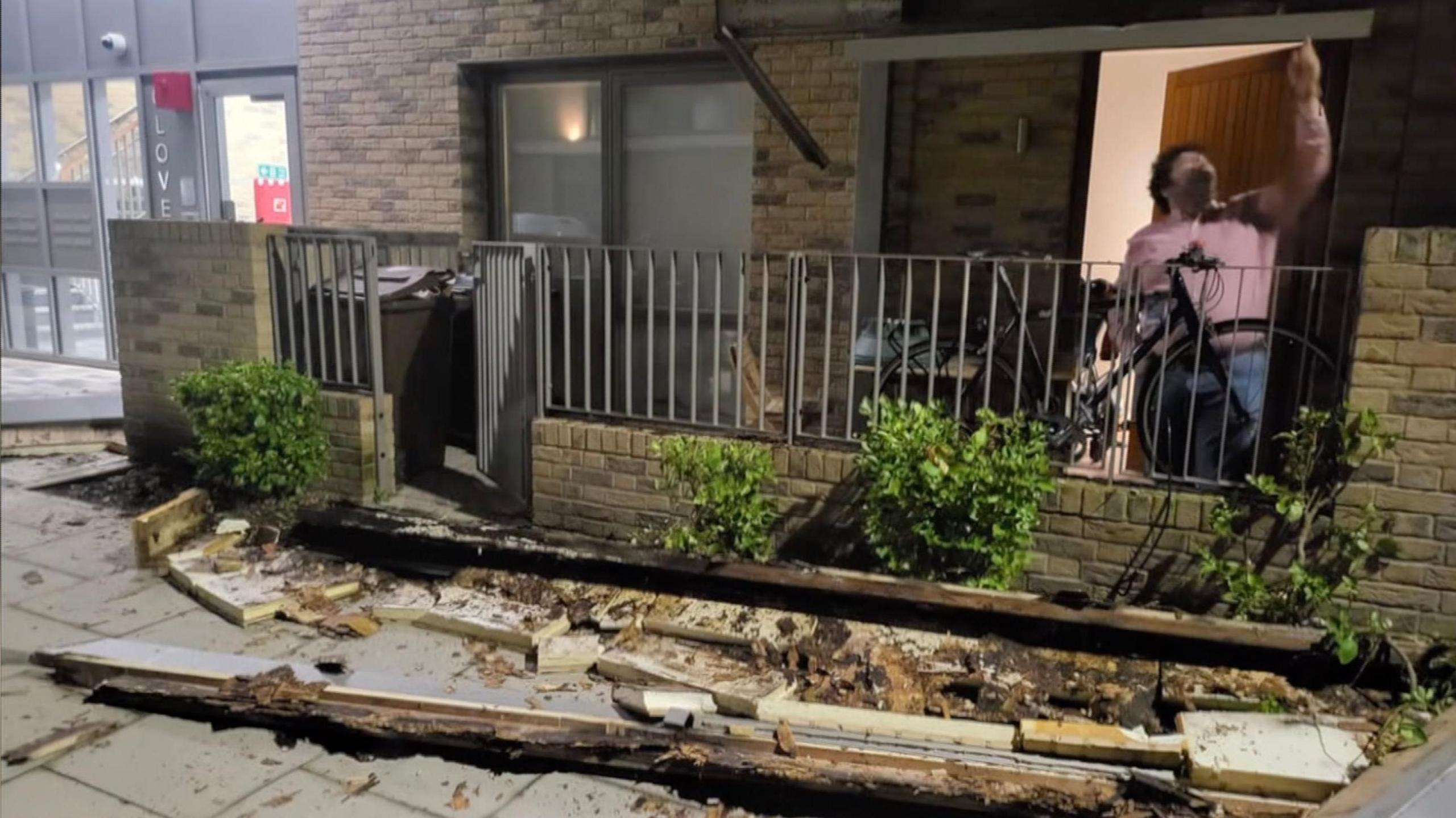
Experts say the balconies on the estate in Barking, east London, were "a disaster waiting to happen"
- Published
Balconies on a new-build housing estate in east London, built by construction giant Bouygues UK, were so poorly designed they "posed a risk to life", a BBC investigation has found.
The BBC previously revealed a balcony that partially collapsed on the Weavers Quarter in Barking was built using the wrong materials, leading to hundreds of residents being told their balconies were unsafe.
But experts who reviewed original plans obtained by the BBC now say the balconies were fatally flawed and prone to collapse from the start, even if built to specification.
Bouygues UK did not answer the new claims directly, referring to an earlier statement in which it apologised and said it had made repairs.
It marks a significant escalation in a case that left hundreds of residents unable to use their balconies for more than a year, with scores of properties still surrounded by emergency scaffolding.
The development, known as Weavers Quarter, was part of a flagship regeneration scheme to deliver affordable housing on the former Gascoigne estate.
It was delivered for Barking and Dagenham Council, which owns the affected homes through its housing company B&D Reside.
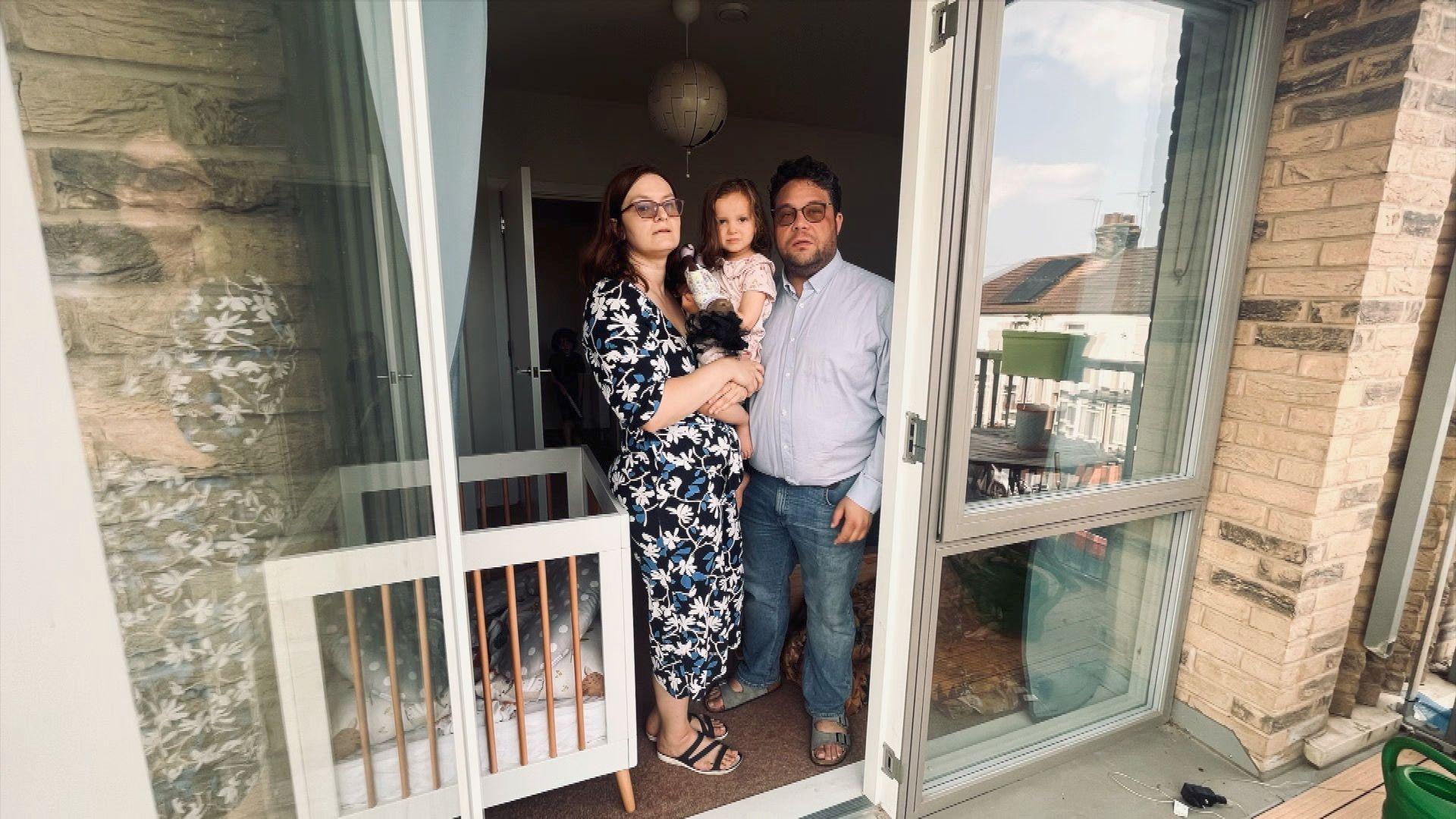
The Surowka family want to move but said "no-one's going to want to buy a house with a dangerous balcony"
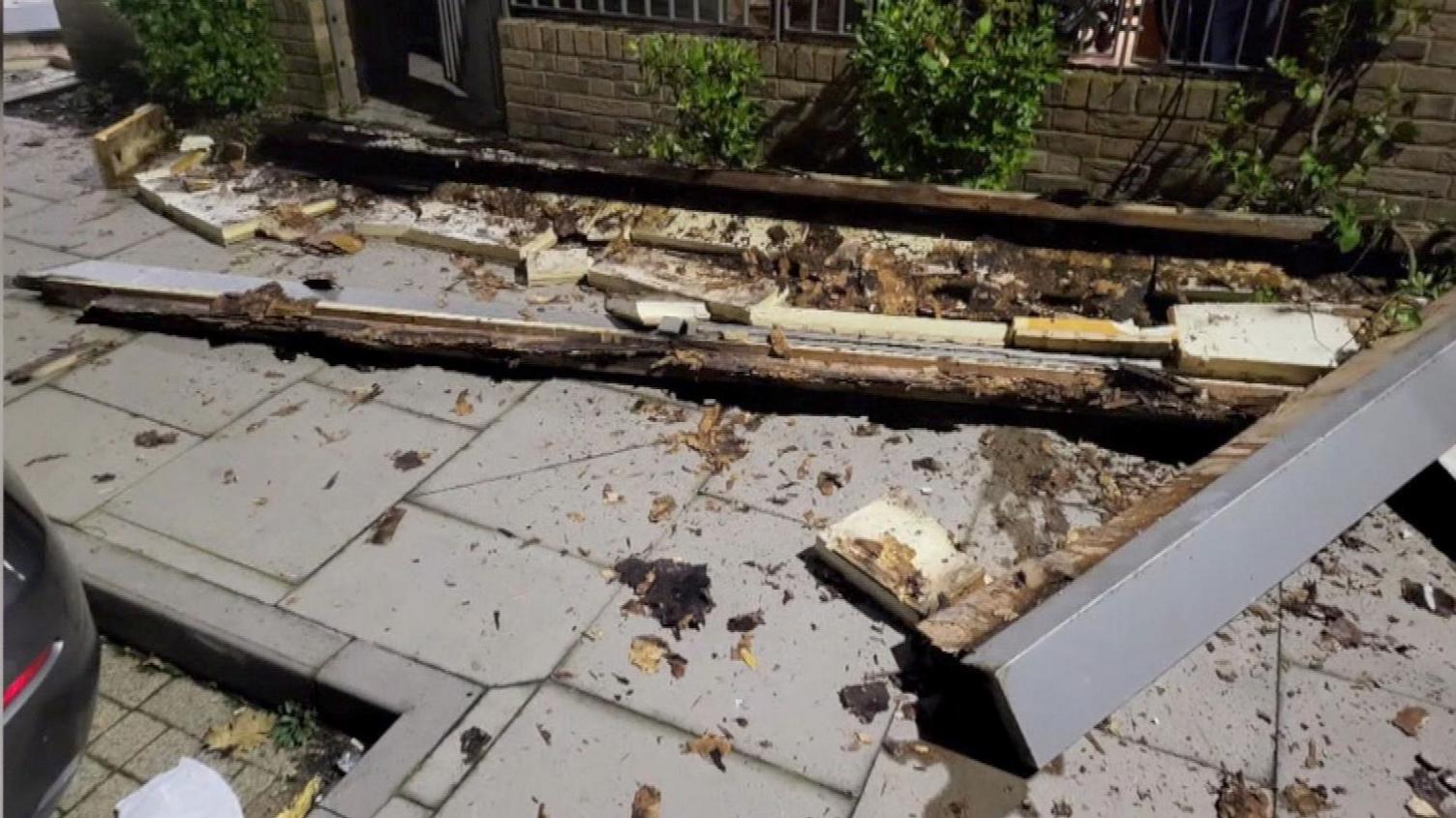
The collapse triggered fears across the estate - with dozens of balconies later declared unsafe
The alarm was raised in late 2023 when part of a balcony suddenly collapsed, after residents had reported other issues for several years.
Kinga Surowka, who lives in the ground‑floor flat beneath the one where the balcony partially collapsed, described the terrifying moment: "There were huge beams of steel, wood, heavy fallen on to my apartment.
"The balcony crashed down - we could have died here with our kids."
The collapse was later seen as "the canary in the coal mine" - a sign that other balconies might also be structurally unsound.
It prompted urgent safety measures, with scaffolding erected around dozens of other balconies. In total, 77 properties were affected and residents were told it was too dangerous to step on to their balconies or walk underneath them.
"We've been pretty scared to use the balconies. My son is still scared," Ms Surowka said as she tentatively used hers with her family for the first time in a year after repair work was completed.
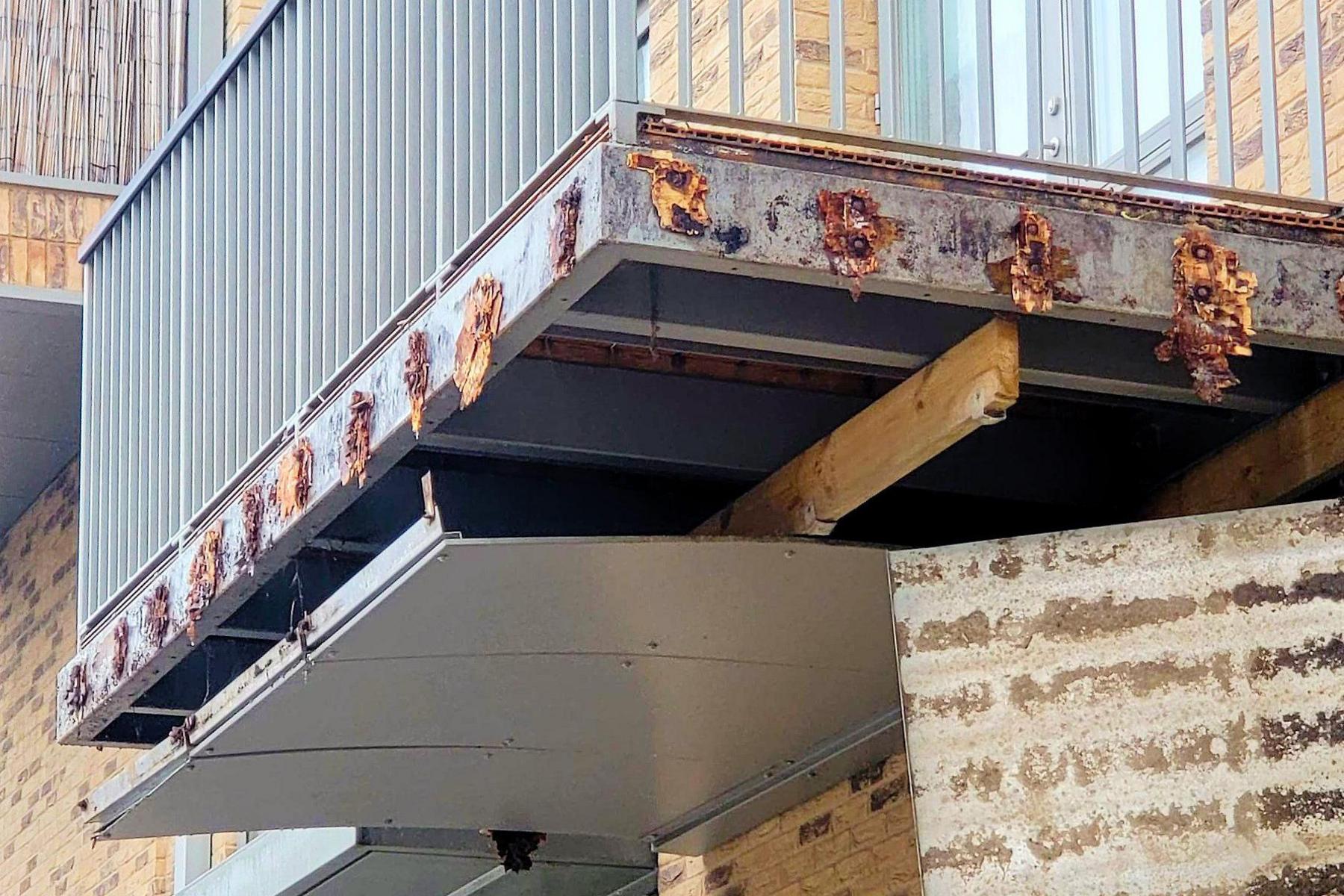
Rusting steelwork and exposed wood could be seen under a balcony
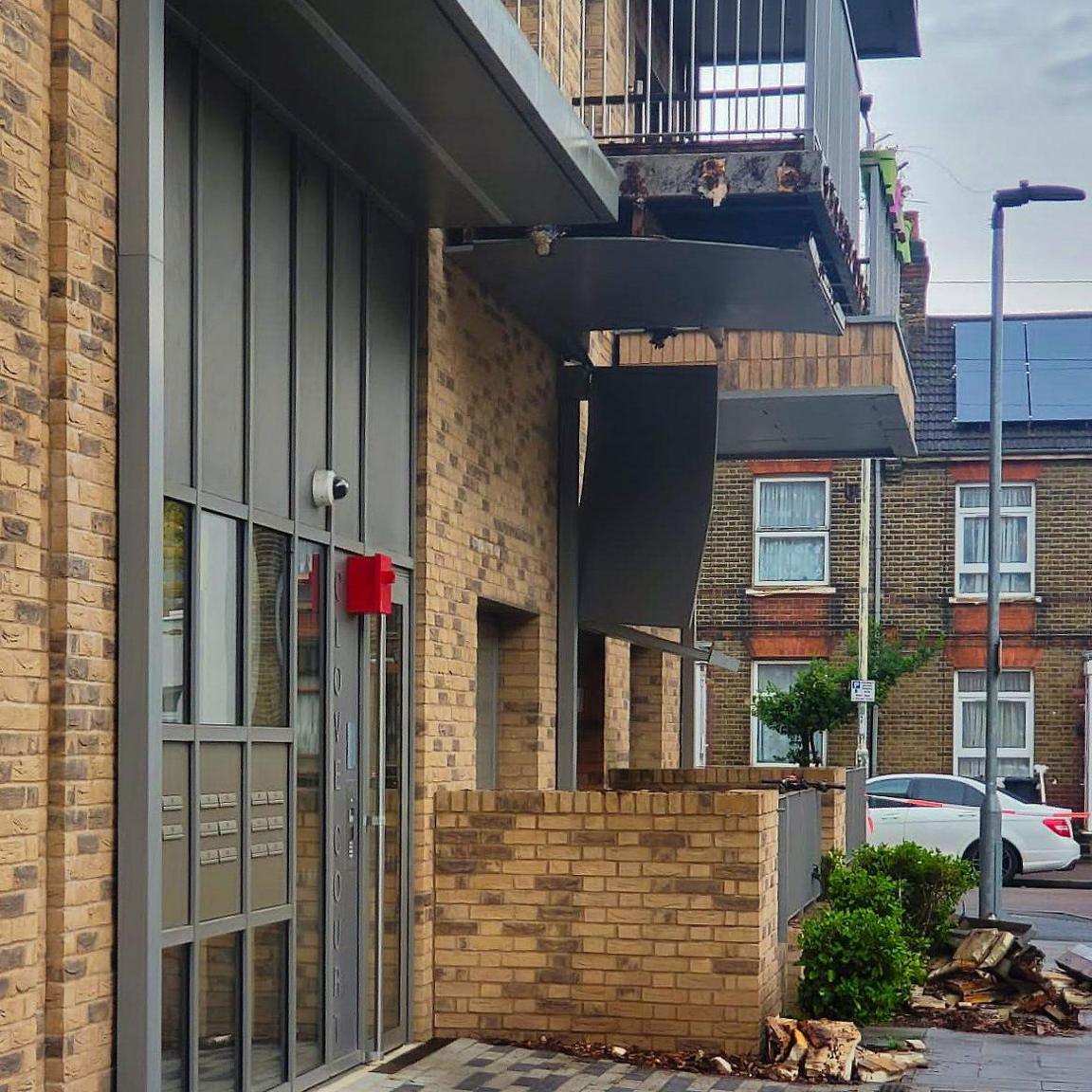
The BBC found crumbling wood and exposed steelwork under a collapsed balcony and after testing found cheap wood had been used contrary to the original design
The collapse led to lab testing by the BBC, which found that plywood from the failed balcony was the type used for indoor fittings, such as kitchen cupboards, and not suitable for outdoor use.
Dr Morwenna Spears, from Bangor University's BioComposites Centre, who tested the material for strength and moisture resistance, said it "should be used indoors only" and called its use outdoors "quite a big fail on somebody's part".
The revelations prompted an investigation by the Health and Safety Executive and led to a major housing award from WhatHouse? being withdrawn.
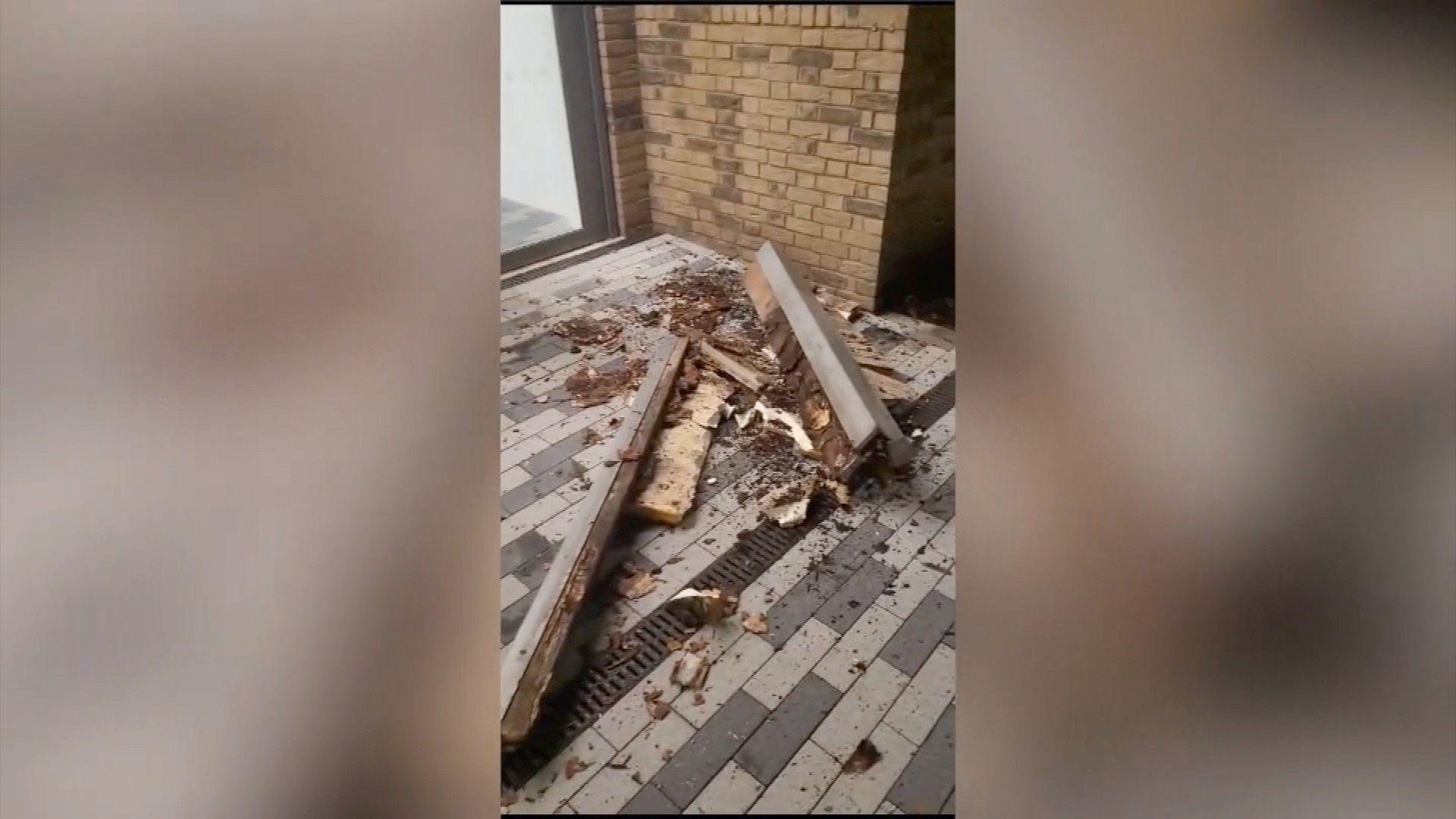
Balcony debris landed outside a family flat, narrowly missing the occupants inside
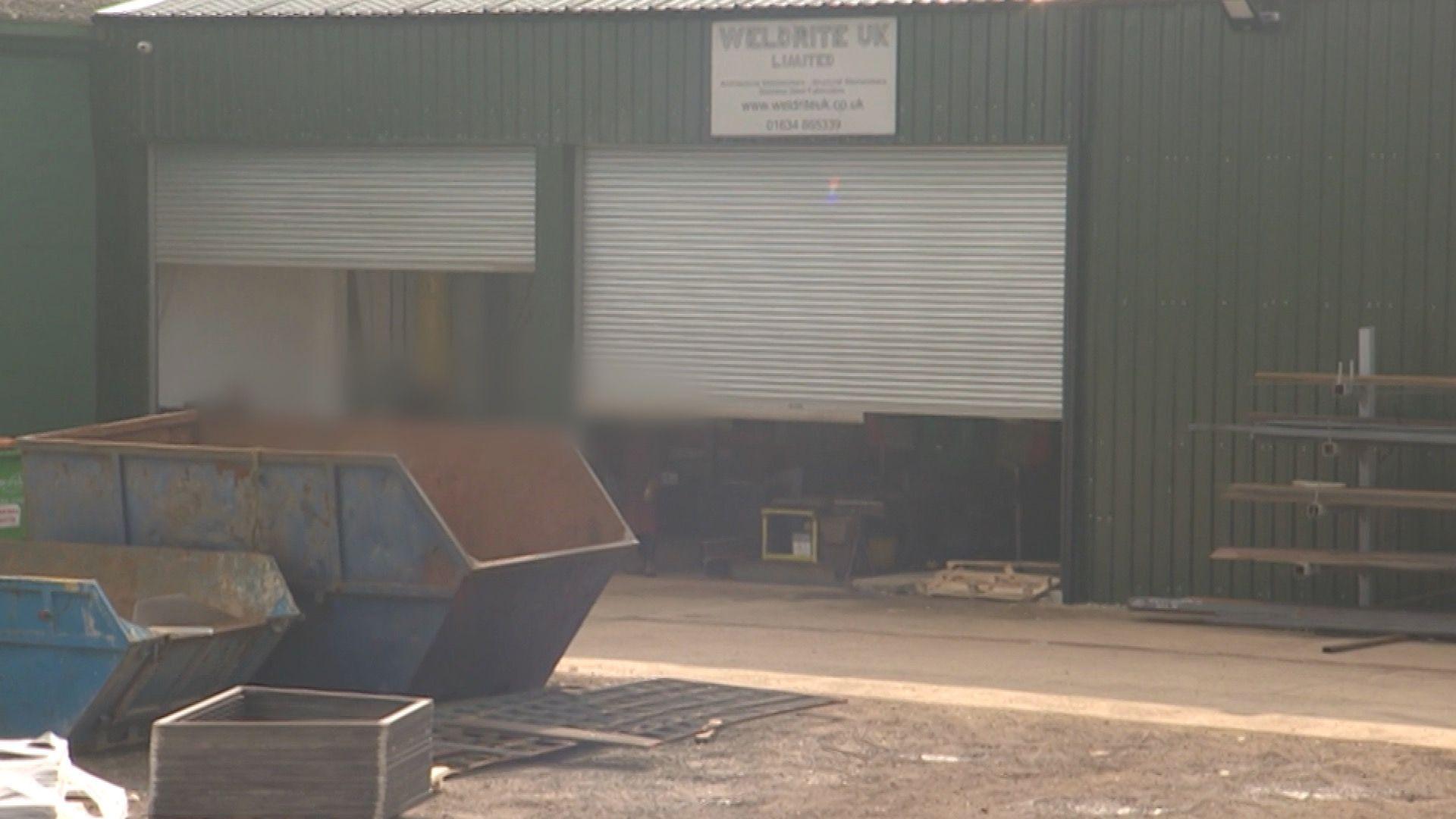
Weldrite UK used cheaper materials than specified but said it was not its fault and Bouygues had signed off the build
Bouygues UK did not initially name the subcontractor that breached the design specification which they produced.
The BBC has since identified the firm as Weldrite UK, based in Kent, which used cheaper, weaker plywood than specified.
The company later told the BBC the balcony issue was not its fault - that Bouygues had signed off the build and never asked for changes, and that the design was flawed from the start.

Lee Smith, one of six experts who analysed the original drawings, said the balconies were so poorly designed they posed "a risk to life" - even with the correct materials
With questions mounting about whether the problem lay not just with the materials but the design as well, the BBC separately obtained the original architectural drawings and commissioned six independent experts to assess them.
All six - including structural engineers, materials specialists and façade consultants - concluded the design was susceptible to failure, even if the correct materials had been used.
They said the use of unsuitable plywood had only hastened the collapse.
One façade expert pointed to poor drainage and support, warning the timber was "liable to rot or degrade, especially if water gets in and can't get out".
'Disaster waiting to happen'
A structural engineer said water-vulnerable materials were placed in areas that would "definitely get wet".
"Even marine ply would have failed," said building surveyor Arnold Tarling.
"It just would've taken longer. The design was a disaster waiting to happen."
Lee Smith, a façade specialist with 30 years' experience, was unequivocal: "This is one of the poorest designs I've seen in my life."
He said critical drainage features were missing.
"The water can't get out. Timber rots. And if it rots, it collapses," he said.
"Whoever signed this off got it badly wrong. It wouldn't stay up. You're looking at risk to life."
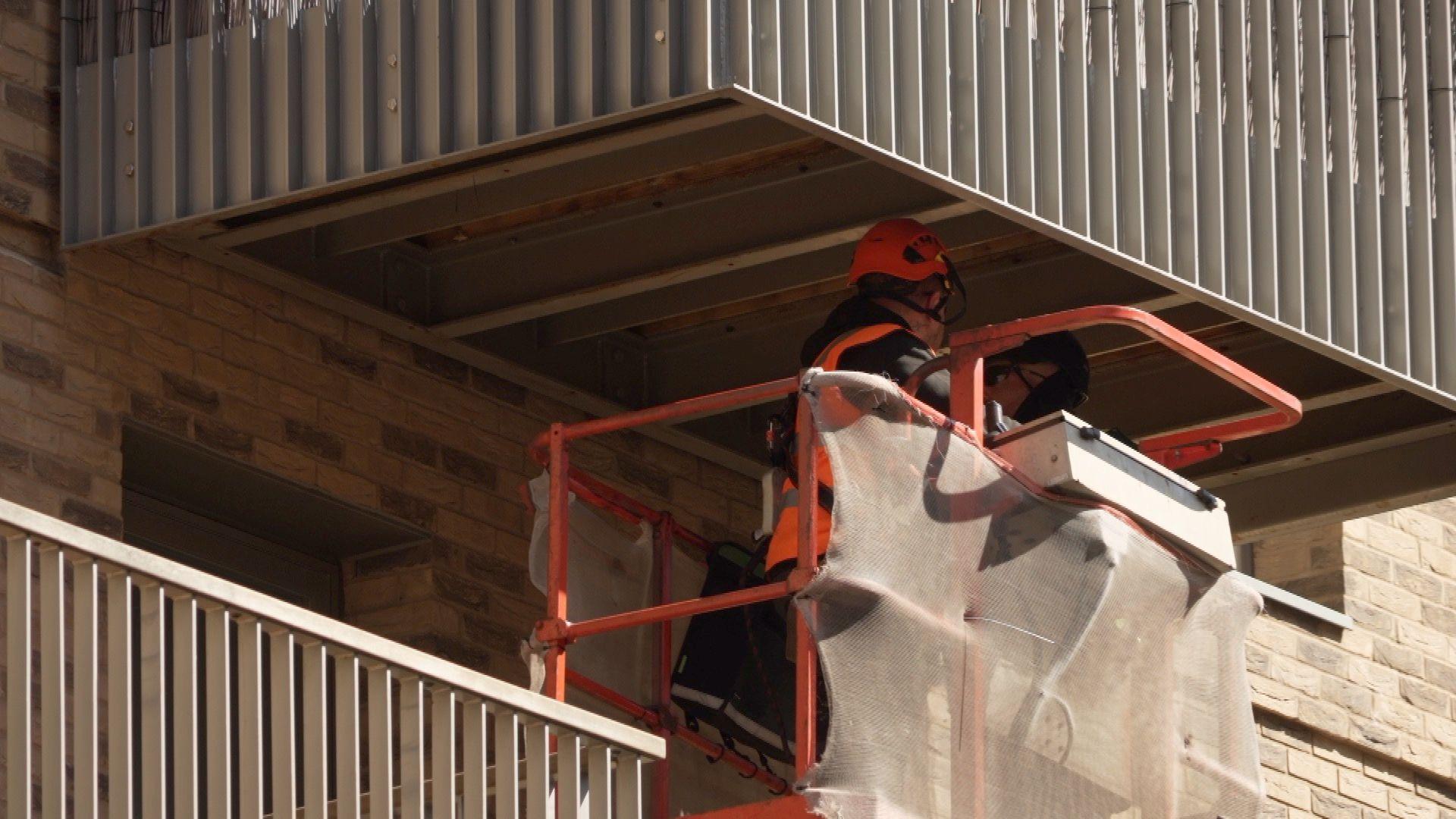
Remedial work on the balconies is still under way
The BBC approached Bouygues UK with the new evidence and asked why balconies with serious design flaws were approved, what safety checks were in place, and why further checks were not conducted before completion.
Bouygues declined to answer those questions, instead referring back to its earlier statement in which it apologised, confirmed it had carried out remediation work, and stated it took safety very seriously.
The company received £41.5m from Barking and Dagenham Council to build the estate.
It ranks among the top 50 contractors in the UK by project value, according to Glenigan's April 2025 league tables, and had an order book of around £1.9bn in 2024 - boosted by its role in the Lower Thames Crossing project.
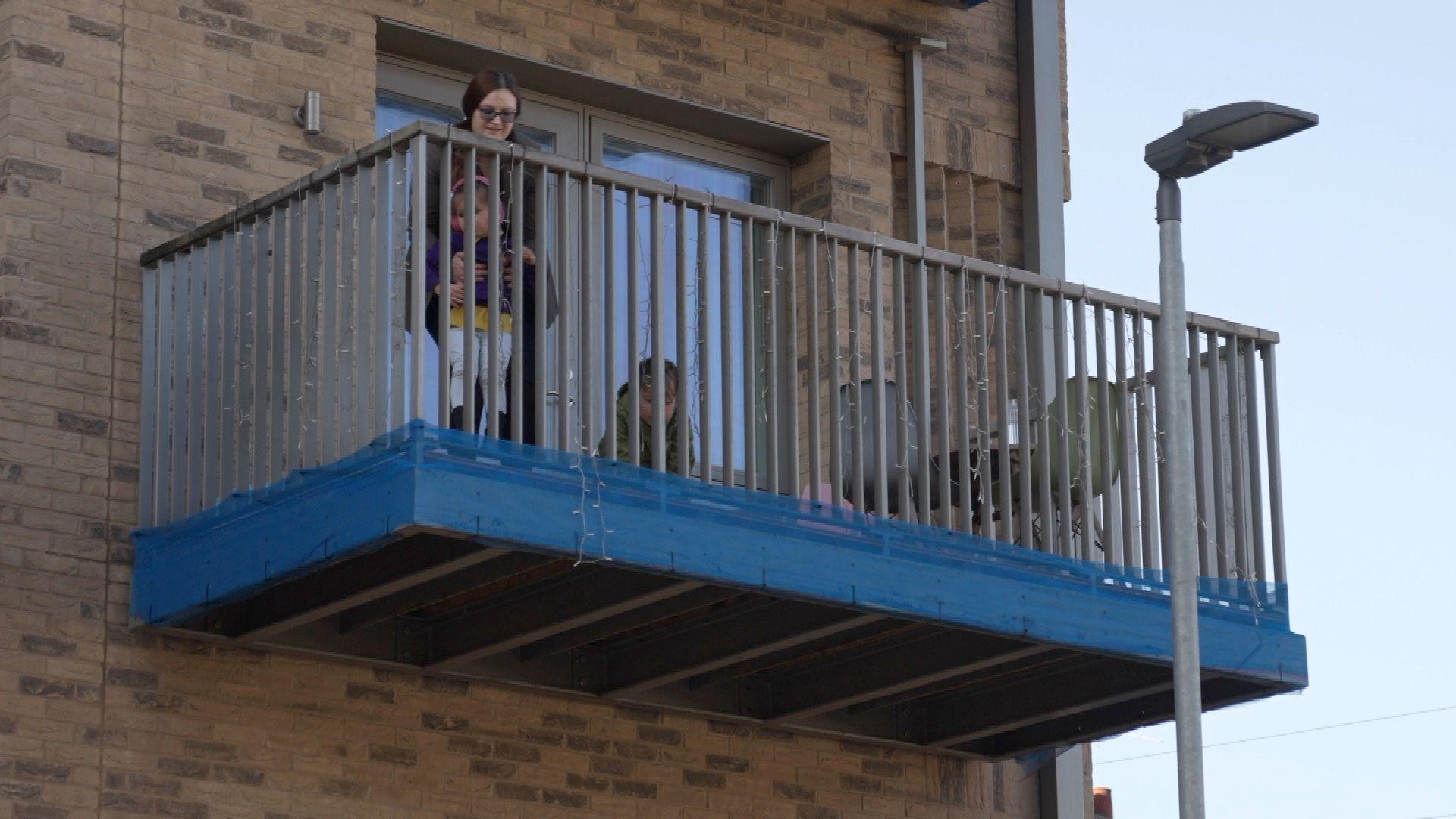
After a year of uncertainty and structural fears, families are finally being allowed back onto their balconies - but many say they have lost faith in the system
Bouygues UK has built homes, schools and hospitals across Britain.
Bouygues Construction, the parent company headquartered in France, is a major global player with substantial contracts in Europe, Africa, Asia and the Americas.
This is not the company's first safety controversy.
In 2014, Bouygues UK was fined £175,000 when a worker was crushed to death at a hospital construction site. In 2009, it was fined £160,000 after a worker was killed by a reversing vehicle at a Barking site.
Most recently, in November 2023, its parent company Bouygues Construction was served an enforcement notice following the death of a worker in a traffic accident during construction of the Hinkley Point C nuclear plant.
Major award pulled after balcony flaws exposed
- Published11 March 2024
BBC finds major flaws in £41m estate's balconies
- Published21 February 2024
Balcony partially collapses on to pavement below
- Published15 November 2023
The discovery that the design itself was flawed has deepened residents' sense of betrayal.
Matt Lismore, who leads the Weavers Quarter Residents' Association, said: "The issue we were told was that it was substandard materials, to then find out that it was actually the design as well brings us right back to square one.
"We're not getting a straight answer, and once again, we feel like our safety is at the bottom of the list."
Many residents are now desperately trying to move away from what was marketed as affordable housing to help people on to the property ladder.
Mark Surowka, Kinga's husband, said: "We totally regret moving here now. We are trying to move out the area, but how can you?
"No-one's going to want to buy a house with a dangerous balcony."
In a statement, Barking and Dagenham Council said: "We know the issues at Weavers Quarter have been deeply frustrating for our residents and they absolutely deserve better. We will be looking closely at the findings of this investigation."
Listen to the best of BBC Radio London on Sounds and follow BBC London on Facebook, external, X, external and Instagram, external. Send your story ideas to hello.bbclondon@bbc.co.uk, external
More from the London and East Investigations team
Meet-and-greet users tell of car damage and mystery miles
- Published23 May
'Mum was killed but her name protects other women'
- Published27 March
Why are people living in the shadow of 'mega-sheds'?
- Published24 April
Get in touch
Do you have a story to share with the BBC London investigations team in confidence?